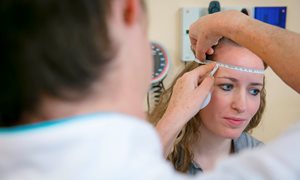
HiFi Solves, a Global Consortium of Clinical Genomics Research Leaders including Radboudumc, was announced by PacBio at this year’s Annual Meeting of the American Society of Human Genetics (ASHG) at Washington DC. Next to this consortium, Radboudumc already leads a subset consortium called HiFi Solves EMEA.
This global consortium brings together researchers from 15 leading genomics research institutions across 11 countries to study the value HiFi-based human genome sequencing may have in clinical research applications and to further our understanding of genetic diseases. These institutions will collaborate to develop and share best practices on data generated from PacBio Revio sequencing systems, with the goal of leveraging the comprehensiveness and completeness of HiFi genomes in human genetics research applications.
Explore causes of rare genetic diseases
“The launch of Revio has enabled researchers to scale HiFi long-read sequencing at unprecedented levels,” said Christian Henry, President and Chief Executive Officer of PacBio. “By creating this consortium, we aim to accelerate global adoption of HiFi sequencing in human genomics through the sharing of best practices so that we may potentially offer families an end to their diagnostic odyssey.”
“Through our ongoing rare disease-focused collaboration with PacBio, we’ve seen tremendous success in the use of HiFi native long-read sequencing to explore the underlying causes of rare genetic diseases that are challenging to identify using other genomic methods,” said Wendy Van Zelst-Stams, Professor of Care for Rare Diseases and new head of the human genetics department at Radboud University Medical Center. “We look forward to collaborating with our global colleagues to share best practices in the use of this technology for rare disease research as we believe it offers the potential to provide tremendous benefit to families in search of answers.”
Two simple questions
PacBio HiFi long-read sequencing has the potential to become a single front-line assay for researchers interrogating rare disease cohorts because of its ability to call and phase all classes of variants accurately, unlike other technologies that require multiple assays. Through the HiFi Solves consortium, researchers will study the efficacy of HiFi sequencing in interrogating the many possible genetic mechanisms that underlie rare diseases. Members of the HiFi Solves consortium will share recent results, particularly around exploring potentially clinically relevant genes that lie in areas of high sequence homology or otherwise complex regions of the human genome.
Interviewed by Huanjia Zhang for GenomeWeb about this new consortium Alexander Hoischen said: "The essence of [our effort] is just asking two very simple questions. One is: 'Can HiFi genomes replace old tests?' … And then maybe scientifically more intriguing is, 'How many extra potential diagnoses can we make by using HiFi genomes in undiagnosed cases?'"
Potential advantages of long-read HiFi sequencing
In addition Zhang writes in GenomeWeb: ‘Hoischen said the collaborators will be using HiFi sequencing to re-analyze about 100 "tricky" mutations that had been previously identified with standard methods in areas of high sequence homology such as pseudogenes or segmental duplications.
The aim of that analysis, which will cover all variant types — single nucleotide variants (SNV), copy number variations (CNV), structural variations (SV), and gene conversions — is to demonstrate the potential advantages of long-read HiFi sequencing for identifying mutations that have been previously hard to detect using traditional technologies, including short-read sequencing.
As for showing the technology’s utility for solving undiagnosed diseases, the group plans to perform whole-genome sequencing on around 300 rare disease samples on the Revio platform, he said.
"The real ambition here would be to make this the first-tier test and stop almost all the other tests for germline testing," Hoischen told GenomeWeb on the sidelines of the conference.
Radboudumc has already developed and validated an in-house amplicon-sequencing-based clinical test on the PacBio Sequel II platform, he said, and has been using that to analyze thousands of clinical samples annually "for quite some years" now.’
“The first half year of using the Revio sequencer has been so promising, that the Department of Human Genetics at Radboudumc decided to purchase a 2nd system this year to accommodate the demand for HiFi genomes,” said Lisenka Vissers Professor for Translational Genomics and co-lead of the Radboudumc efforts.
-
More about the collaboration between Radboudumc and PacBio here
Participating institutions of the HiFi Solves consortium are:
- Bioscientia Institute for Medical Diagnostics (GmbH) (Germany)
- Broad Institute of MIT and Harvard (U.S.A.)
- Children’s Hospital of Eastern Ontario (Canada)
- Children’s Mercy Kansas City (U.S.A)
- Chulalongkorn University (Thailand)
- Hospital for Sick Children (SickKids) – (Canada)
- i-Lac (Japan)
- Karolinska University Hospital and Karolinska Institutet (Sweden)
- KK Women’s and Children’s Hospital (Singapore)
- University Clinic Schleswig-Holstein (Germany)
- Medizinische Universität Innsbruck (Austria)
- National Center for Child Health and Development (Japan)
- Radboudumc (Netherlands)
- SciLifeLab (Sweden)
- University of Leuven (Belgium)
-
Want to know more about these subjects? Click on the buttons below for more news.
Related news items

Women more likely to develop mild variant Stargardt's disease
24 May 2024In the mild form of Stargardt's disease, an inherited eye disease, women are more likely to experience vision problems than men. This is shown in doctoral research by Stéphanie Cornelis.
go to page
New Nijmegen method reveals hidden genetic variations Valuable data mining in the dark corners of the exome now possible worldwide
1 November 2023Many hidden genetic variations can be detected with Chameleolyser, a new method developed in Nijmegen.
go to page
Advancing Therapies for Pediatric Renal Ciliopathies - TheRaCil
5 October 2023The Imagine Institute will coordinate the project Therapies for Renal Ciliopathies (TheRaCil), a project funded through Horizon Europe for the period 2021-2027 in which Radboudumc participates.
go to page

